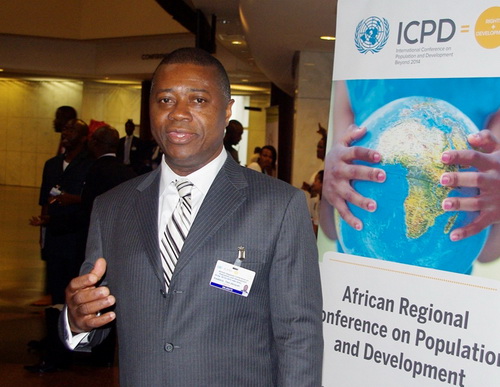Africa makes gains, but gaps exist in achieving sustainable development --- Report
 An operational review to document the progress and achievements in the implementation of the International Conference on Population and Development(ICPD) Programme of Action (PoA) shows that significant progress has been made in the implementation in Africa , but the agenda still remains quite unfinished and gaps still exit.
An operational review to document the progress and achievements in the implementation of the International Conference on Population and Development(ICPD) Programme of Action (PoA) shows that significant progress has been made in the implementation in Africa , but the agenda still remains quite unfinished and gaps still exit.
The ICPD PoA was a consensus document that put forward concrete actions and objectives through which governments and countries could achieve sustained economic growth and sustainable development, with human rights, equality, equity and dignity as the standard of human well-being.
Global Survey
As part of the review a global survey was developed by the United Nations Population Fund UNFPA in consultation with the UN Economic Commission of Africa (UNECA), other regional commissions and stakeholders to stimulate dialogue and consultation among the various stakeholders and sectors at the country level so as to foster a shared understanding of achievements and challenges; identify opportunities to accelerate the achievement of results, particularly with respect to areas where implementation is lagging behind; renew commitment and ownership for the Cairo Agenda; and strengthen and broaden partnerships around ICPD issues.
In a presentation of the global process at the Africa Review Conference of the ICPD PoA underway in Addis Ababa, Mr. Kwabena Osei Danquah, Executive Coordinator of the ICPD Beyond 2014 Secretariat said 176 countries completed the global survey.
African Review
In Africa, he said, the participation of countries in the operational review was exemplary as 52 countries filled the questionnaire, compared to 43 in 2009, 43 in 2004 and 41 in 1999.
“This high level of participation indicates the commitment of countries to the operational review,” said Mr. Danquah.
Another tool used in the operational review in Africa is country reports which follow a standard structure so as to enable comparability between countries, he said.
“Within each country the operational review was quite engaging. Parliamentarians, the private sector, among others participated in the operational review,” Mr. Danquah added.
He said the Africa regional report of the operational review provides scientific analyses and authoritative account of the state of population and development, the status of the implementation of the ICPD PoA, and future plans and recommendations for the ICPD beyond 2014.
Focusing on the theme: Harnessing the Demographic Dividend: the Future We Want For Africa, the report emphasises the need for state and non-state actors to recommit themselves at the highest level to fully implement the ICPD PoA in Africa.
Mr Danquah stated that the outcomes of the report will serve as a major reference for population and development policies and programmes beyond 2014, and inform the development agenda post 2015 in Africa.
Main findings and Recommendations
Presenting the main findings and recommendations of the regional survey, Mr. Hassan Musa Yousif of the UNECA said tremendous gains have been made in all aspects of health, and economic, political and social development.
“The operational review reflects a high level of political commitment on the part of African countries to the implementation of the ICPD PoA,” he said.
Progress, Mr Yousif indicated has been facilitated by a wide range of ICPD related regional policies and frameworks on health, maternal health, the family, older persons, persons with disabilities, international migration and development, social development, among others that are being adopted and implemented under the auspices of the African Union (AU).
Mr. Yousif however emphasised that progress made on the ICPD agenda is uneven, as some issues and priorities received more attention than others.
“In general, the issues related to improvement of reproductive health and rights, gender equality, equity and empowerment of women appear to be implemented widely,” he said.
On the other hand, issues relating to the needs of older people, persons with disabilities, urbanisation and internal migration, international migration and development, seem, for the time being, to receive less attention, Mr. Yousif added.
It is noteworthy, he said, that despite marked achievements in most of the health indicators, Africa’s people – particularly its women and children – still die of preventable causes in greater numbers than in any other region. In 2010, there were over 165,000 maternal deaths in Africa, all due to preventable causes, including unsafe abortion.
Mr. Yousif said it was clear that government commitment to issues pertaining to older persons, such as promoting employment opportunities for older workers, providing support to families caring for older people or extending or improving old age allowances must be stepped up.
Governments also showed significant commitment to improving the welfare of girls; ensuring equal access of girls to education at all levels and ending sexual and gender-based violence
In addition, there was support for increasing women's participation in the formal and informal economy and increasing women's representation in political processes and public life.
According to Mr. Yousif, the narrowing of the gender gap in education, and the increasing numbers of women in parliament and in national office, are further testimony to Africa’s remarkable progress.
He noted emphatically that the continent is faced with challenges in the area of urbanisation, migration and climate change and these must all be addressed if the region is to achieve sustainable development.
By Rosemary Ardayfio ADDIS ABABA
Daily Graphic/graphic.com.gh/Ghana